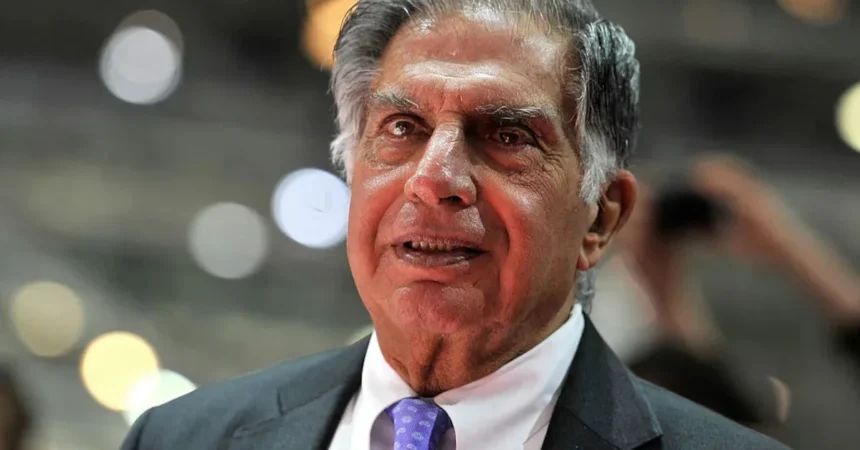Mumbai, India’s bustling financial capital, has declared a day of mourning to honor the life and legacy of Ratan Tata, one of the most revered figures in Indian industry. Known for his visionary leadership, ethical business practices, and transformative impact on the country’s industrial and social landscape, Ratan Tata’s passing has left a void not only in the world of business but also in the hearts of millions across the globe. This solemn tribute underscores the profound respect and admiration the people of Mumbai—and indeed all of India—have for the legendary industrialist, philanthropist, and statesman.
Ratan Tata, who led the Tata Group to international prominence, is credited with reshaping the Indian economy and contributing to the country’s development in immeasurable ways. His influence extended far beyond business, touching every aspect of society through his philanthropy, innovation, and commitment to progress. This article delves into the immense contributions Ratan Tata made throughout his life, the significance of this day of mourning, and the lasting legacy he leaves behind.
The Life and Legacy of Ratan Tata
Ratan Tata, born on December 28, 1937, in Mumbai, belonged to one of India’s most distinguished business families. The Tata family, known for its contributions to Indian industry since the 19th century, had already established a formidable legacy when Ratan Tata took the helm of Tata Group in 1991. Under his leadership, the Tata Group grew from a largely domestic conglomerate into a global powerhouse, with operations spanning more than 100 countries and a presence in industries ranging from steel and automobiles to telecommunications and software.
Ratan Tata’s leadership was defined by his emphasis on innovation, global expansion, and social responsibility. His acquisition of global brands like Jaguar Land Rover and Tetley Tea marked India’s entry into the global corporate elite, while his launch of the Tata Nano, the world’s most affordable car, was a bold attempt to revolutionize transportation for India’s middle and lower classes.
Beyond business success, Ratan Tata was known for his personal humility and commitment to ethical practices. He was a businessman who believed in doing the right thing, even when it was difficult. This earned him not just financial success, but deep respect from employees, peers, and the public alike.
The Philanthropic Vision of Ratan Tata
While Ratan Tata’s achievements in business are well documented, his philanthropic endeavors are perhaps his most enduring legacy. Throughout his life, he believed in giving back to society, a principle instilled in him by his family. The Tata Group, through its various charitable trusts, has been instrumental in the establishment of numerous educational institutions, hospitals, and research centers in India.
One of his most significant contributions came in the realm of education. Under his guidance, the Tata Trusts played a pivotal role in funding higher education for thousands of Indian students, particularly in fields like engineering, science, and medicine. The establishment of the Indian Institute of Science in Bangalore and the Tata Institute of Fundamental Research are just two examples of how the Tata family has contributed to India’s intellectual and technological advancement.
Ratan Tata also focused on rural development and health care. His initiatives to provide clean drinking water, promote women’s education, and improve public health facilities in rural India have improved the quality of life for millions of people. He was also a leading advocate for sustainable development, pushing the Tata Group to adopt environmentally friendly practices long before it became a global trend.
Tributes Pour in for Ratan Tata
As news of Ratan Tata’s passing spread, tributes began pouring in from all corners of the world. Political leaders, industrialists, and ordinary citizens took to social media to express their grief and share their memories of the man who had touched so many lives. Indian Prime Minister Narendra Modi referred to Tata as “a true titan of Indian industry” and “a beacon of integrity and innovation.” Business magnates such as Mukesh Ambani and Anand Mahindra praised his foresight and contributions to India’s global standing.
International leaders, too, expressed their admiration for Ratan Tata. British Prime Minister Rishi Sunak recalled Tata’s pivotal role in reviving Jaguar Land Rover, while former U.S. President Barack Obama commended his humanitarian efforts and called him “a global leader whose vision extended far beyond profit.”
In Mumbai, the heart of India’s business world, corporate offices, schools, and public institutions lowered their flags to half-mast as a mark of respect. The Bombay Stock Exchange observed a moment of silence in honor of the man whose business acumen and ethical practices had inspired generations of entrepreneurs.
Mumbai’s Day of Mourning: A City Pays Tribute
Mumbai’s decision to declare a day of mourning is a testament to the profound connection Ratan Tata had with the city of his birth. For many Mumbaikars, Tata was not just an industrialist but a symbol of the city’s resilience, ingenuity, and generosity. His life mirrored the story of Mumbai itself—a city of contrasts where vast wealth and crushing poverty exist side by side, yet both are bound together by a common thread of aspiration and hope.
On the day of mourning, the city came to a near-standstill as people from all walks of life paid their respects. Candlelight vigils were held outside the Tata Group headquarters at Bombay House, and thousands gathered at public spaces like the Gateway of India and Marine Drive to observe moments of silence. Local newspapers published special editions dedicated to Ratan Tata’s life, with front-page tributes chronicling his journey from a young man reluctant to join the family business to one of the most respected figures in global industry.
Religious leaders from all major faiths conducted special prayers in memory of Tata, acknowledging his contributions to India’s secular ethos and the Tata Group’s support for interfaith harmony. Christian churches, Hindu temples, and Muslim mosques across the city held services in his honor, highlighting his commitment to social justice and equality.
The Impact of Ratan Tata on Indian Industry
Ratan Tata’s influence on Indian industry cannot be overstated. He inherited the Tata Group at a time when India was on the cusp of economic liberalization, and his bold leadership helped propel the company—and the country—into a new era of global competitiveness. Under his stewardship, Tata Group diversified into new sectors and expanded its global footprint, becoming a symbol of Indian industry on the world stage.
Perhaps his most significant contribution to Indian industry was his unwavering focus on values-driven leadership. He believed that businesses had a responsibility to society, and this philosophy guided every decision he made. Whether it was his commitment to employee welfare or his insistence on environmental sustainability, Tata’s approach to business was always guided by a sense of moral responsibility.
His leadership also saw the Tata Group weather some of its most difficult challenges, including the 2008 terrorist attacks on the Taj Mahal Palace Hotel, a Tata-owned property. Ratan Tata’s response to the tragedy was widely lauded, as he personally oversaw the rehabilitation of employees and families affected by the attack, demonstrating a level of compassion rarely seen in corporate leadership.
Ratan Tata’s Enduring Legacy
As Mumbai mourns the loss of Ratan Tata, his legacy will undoubtedly endure for generations to come. His contributions to Indian industry, his philanthropic efforts, and his commitment to ethical leadership have left an indelible mark on the country and the world. Future business leaders will continue to look to him as a role model for how to succeed in business while remaining grounded in values of integrity, compassion, and social responsibility.
In the years to come, Ratan Tata’s vision for a more equitable and prosperous India will serve as a guiding light for those working to make his dream a reality. His impact will be felt not only in boardrooms and factories but in the lives of millions of people who benefited from his generosity and vision.
#RatanTata #MumbaiMourning #IndianIndustry #Philanthropy #TataGroup #LegacyOfLeadership #VisionaryLeader #EthicalBusiness #SocialResponsibility #IndianEconomy







